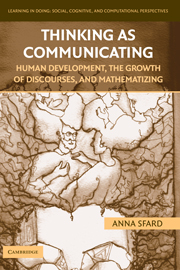Book contents
- Frontmatter
- Contents
- Series Foreword
- Introduction
- Acknowledgments
- Part I Discourse on Thinking
- 1 Puzzling about (Mathematical) Thinking
- 2 Objectification
- 3 Commognition: Thinking as Communicating
- 4 Thinking in Language
- Part II Mathematics as Discourse
- Glossary of Commognition
- References
- Name Index
- Subject Index
- Titles in the series
1 - Puzzling about (Mathematical) Thinking
Published online by Cambridge University Press: 27 July 2009
- Frontmatter
- Contents
- Series Foreword
- Introduction
- Acknowledgments
- Part I Discourse on Thinking
- 1 Puzzling about (Mathematical) Thinking
- 2 Objectification
- 3 Commognition: Thinking as Communicating
- 4 Thinking in Language
- Part II Mathematics as Discourse
- Glossary of Commognition
- References
- Name Index
- Subject Index
- Titles in the series
Summary
One … fact must astonish us, or rather would astonish us if we were not too much accustomed to it: How does it happen that there are people who do not understand mathematics? If the science invokes only the rules of logic, those accepted by all well-formed minds, how does it happen that there are so many people who are entirely impervious to it?
Henri PoincaréFull of puzzles, mathematics is a puzzle in itself. Anybody who knows anything about it is likely to have questions to ask. Most of us marvel about how abstract mathematics is and wonder how one can come to grips with anything as complex and as detached from anything tangible as this. The concern of those who do manage the complexity, as did the French mathematician and philosopher of science Henri Poincaré, is just the opposite: The fortunate few who “speak mathematics” as effortlessly as they converse in their mother tongue have a hard time understanding other people's difficulty. From a certain point in our lives, it seems, mathematical understanding becomes an “all or nothing” phenomenon – either you have it, or you don't – and being in any of these two camps appears so natural that you are unable to imagine what it means to be in the other.
But the bafflement with regard to mathematics goes further than that. Literature about human thinking is teeming with resilient mathematics-related puzzles.
- Type
- Chapter
- Information
- Thinking as CommunicatingHuman Development, the Growth of Discourses, and Mathematizing, pp. 3 - 33Publisher: Cambridge University PressPrint publication year: 2008



